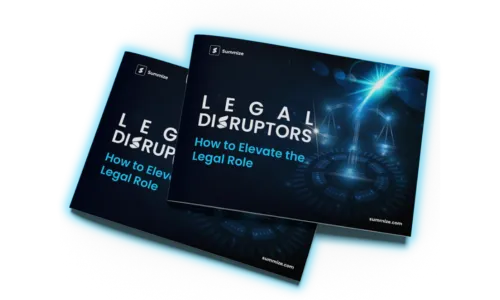Trends in IP & patent law
In this episode, Rosie Burbidge talks to Summize's CTO Richard Somerfield about the trends in IP and patent law and how they feel about hybrid working.
May 15, 2022
December 19, 2025
On this episode of our Legal Disruptors podcast, Rosie Burbridge, a specialist intellectual property (IP) lawyer and partner at gunnercooke llp, chats with Richard Somerfield, CTO of Summize, about trends in IP and patent law, as well as the evolving hybrid working model. Together, they delve into the challenges and innovations shaping the legal and tech industries today.
Meet today's speakers
Rosie Burbridge brings a unique perspective to IP law, combining creativity with a deep understanding of business strategy. She explains that her attraction to IP stems from its intersection of innovation, international reach, and the opportunity to work closely with clients across diverse sectors. As a partner at gunnercooke, Rosie operates almost like running her own business within the firm. This approach gives her a firsthand understanding of the commercial pressures clients face, enabling her to provide advice that balances legal requirements with practical business needs.
Richard Somerfield, with extensive experience in software and technology, offers a complementary perspective. As CTO of Summize, he understands the fast-paced demands of startups and the importance of protecting innovation while navigating complex IP landscapes. Their conversation offers a rare blend of legal insight and technological know-how, making it especially relevant for innovators and entrepreneurs.
Patents, IP strategy, and start-up guidance
One of the key topics Rosie and Richard explore is patent law and IP strategy for startups. Rosie explains that timing is crucial when it comes to patents, particularly for R&D-focused businesses. Filing early is essential, as public disclosure can significantly limit patent options. However, startups often face a dilemma: they need to showcase their innovation to attract funding but may lack the budget for extensive patent filings.
Rosie emphasizes that not all IP protection requires a patent. For software, copyright is often more practical, covering the source code as a literary work. She also highlights lesser-known protections, such as registered and unregistered designs, which can safeguard user interfaces and other visual elements of a product. Additionally, she advises startups to consider IP insurance and leverage tax incentives like R&D credits or the Patent Box to offset costs.
Navigating the evolving IP landscape
Another interesting discussion centers on how IP laws are adapting, or struggling to adapt, to modern technology. Rosie notes that software patents in Europe and the UK require a technical contribution, reflecting the fact that traditional patent law was designed for physical products, not fast-moving digital innovations. She also highlights the role of “non-practicing entities,” companies that purchase patents to enforce licensing agreements, and how startups can proactively protect themselves while avoiding potential infringement disputes.
Technology and disruption in legal practice
Rosie also touches on the technological changes reshaping legal work. The pandemic accelerated adoption of digital tools, from virtual hearings to electronic filings, eliminating outdated practices like faxing. These innovations have improved efficiency, reduced costs, and made collaboration across geographies much easier. Rosie reflects on how embracing technology has not only transformed client service but also enhanced the day-to-day work experience for lawyers.
Hybrid working and mentoring challenges
Finally, our speakers delve into the hybrid working model and its impact on team dynamics. Rosie shares her experience managing a junior team, noting that remote work can hinder training, development, and mentoring. While hybrid models offer flexibility, she emphasizes the importance of in-person interaction, especially for junior staff who benefit from close guidance. She also highlights structural tensions in larger firms, where the burden of mentoring can fall unevenly, potentially creating divisions in the workforce.
Tune in for the full conversation
This episode of Legal Disruptors offers an insightful look at IP law, the nuances of patent protection, and the realities of hybrid work in modern legal practice. Rosie Burbridge and Richard Somerfield provide practical tips and share thought-provoking perspectives that are valuable for entrepreneurs, tech professionals, and legal practitioners alike. To get the full depth of their discussion, including real-world examples and actionable advice, listen to the full podcast at the start of the article, and explore more from our Legal Disruptors below.
Discover even more!
Explore more about contracting and CLM in our ultimate contract guides








